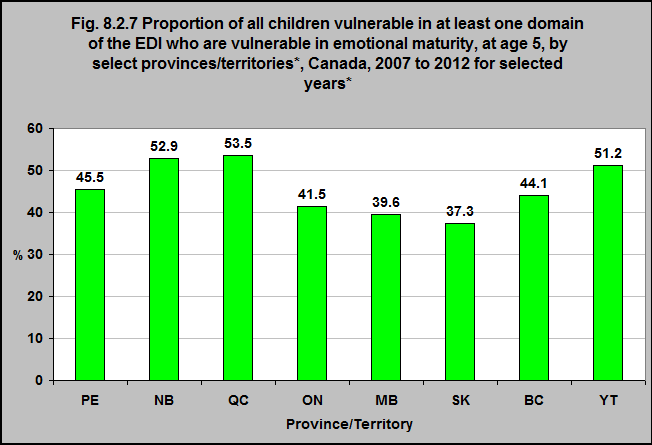Proportion of all children vulnerable in at least one domain of the EDI who are vulnerable in emotional maturity, at age 5, by select provinces/territories, Canada, 2007 to 2012 for selected years

Notes:
*Provincial/territorial analysis is available for only those jurisdictions that have complete province-/territory-wide coverage and have participated in this analysis.
Data Years: P/T Data collection Period
PE 2007-2008
NB 2008-2009
QC 2011-2012
ON 2009-2010 to 2011-2012
MB 2010-2011
SK 2008-2009 to 2010-2011
BC 2009-2010 to 2010-2011
YT 2011-2012
NT not available
Source: CICH graphic created using data adapted from Canadian Institute for Health Information. Children Vulnerable in Areas of Early Development: A Determinant of Child Health. Ottawa, ON: CIHI; 2014.
https://secure.cihi.ca/free_products/Children_Vulnerable_in_Areas_of_Early_Development_EN.pdf -accessed July 24, 2017.
The Emotional Maturity domain of the Early Development Instrument (EDI)** includes the ability to think before acting, a balance between being too fearful and too impulsive, an ability to deal with feelings at the age-appropriate level, and empathetic response to other people’s feelings.
More than half of all children in Québec and New Brunswick (53.5% and 52.9% respectively) who are vulnerable in at least one area of the EDI are vulnerable in emotional maturity.
37.3% of the children in Saskatchewan who are vulnerable in at least one area of the EDI are vulnerable in emotional maturity.
There are differences between how the EDI is administered between provinces and territories, as well as differences in how often it is administered. Therefore, the time period is not uniform – this needs to be considered when looking at differences across province/territories.
**For more information on the Early Development Instrument (EDI) please click here
